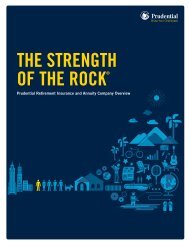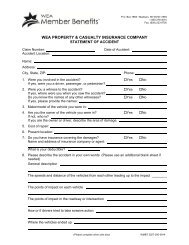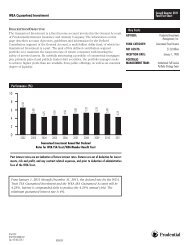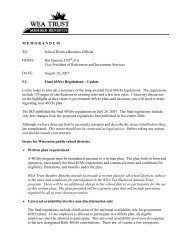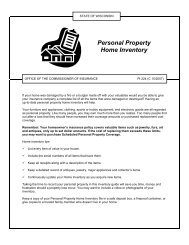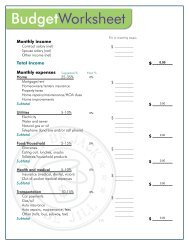View PDF - WEA Trust Member Benefits
View PDF - WEA Trust Member Benefits
View PDF - WEA Trust Member Benefits
Create successful ePaper yourself
Turn your PDF publications into a flip-book with our unique Google optimized e-Paper software.
{ your decision<br />
Who will inherit your<br />
403(b) or IRA account?<br />
Don’t leave it to<br />
CHANCE.<br />
Choosing beneficiaries comes down to this: How do you want your assets distributed<br />
after you’re gone? Know your options so you can make the best choice for you.<br />
Naming beneficiaries for your<br />
403(b) and IRA retirement<br />
accounts is an important first<br />
step in your estate planning,<br />
but not all beneficiaries are treated alike.<br />
A beneficiary can be a person or persons, a<br />
trust, a charity, or your estate. Which is right<br />
for you? Without careful consideration,<br />
your decision may have unexpected tax and<br />
estate planning implications.<br />
benefit from tax deferral features associated<br />
with the retirement accounts.<br />
The trust option<br />
There may be circumstances when<br />
you may want to name a trust as your<br />
retirement account beneficiary. Naming a<br />
trust as your beneficiary is a way to control<br />
post-death distributions and restrict access<br />
for beneficiaries who might need help<br />
are quirky. If not set up properly, it can go<br />
very badly for your beneficiaries. Make<br />
sure to work with someone who has<br />
expertise with setting up trusts to ensure<br />
your wishes are met.<br />
Charity as beneficiary<br />
If you have already provided for your<br />
heirs and you have charitable inclinations,<br />
6<br />
The estate option<br />
Generally, naming your estate as your<br />
beneficiary by design or by default is bad<br />
estate planning. In general, it produces<br />
unfavorable distribution options and makes<br />
your retirement funds subject to probate,<br />
which can be an expensive and timeconsuming<br />
process.<br />
Because only a person can own a<br />
retirement account, your account(s) will<br />
need to be liquidated in order to pay your<br />
estate. Liquidating the account eliminates<br />
all flexibility for your heirs to take<br />
distributions from the account over their<br />
life expectancy, which means they will not<br />
Generally, naming your estate as beneficiary—by<br />
design or default—is bad estate planning.<br />
managing the money from large inherited<br />
accounts.<br />
However, there are pitfalls to a trust.<br />
There are no tax benefits to naming a trust<br />
for the exclusive purpose of managing the<br />
distribution of your retirement savings<br />
accounts. Because a trust is not a person, as<br />
with the estate option, retirement accounts<br />
need to be liquidated. Additionally, trusts<br />
naming a charity is also an option.<br />
Generally, withdrawals from pre-tax<br />
retirement accounts are subject to tax.<br />
However, an exception may apply to direct<br />
distributions to qualified charities. If you<br />
decide to name a charity, contact the<br />
charity to get the proper name to avoid<br />
confusion or problems later on.<br />
weabenefits.com




